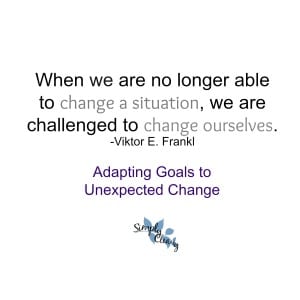This year has gotten off to a bit of a rough start for me. Last Monday, I simultaneously bent over to put something away and sneezed at the same time, which caused a pop and horrible pain in my lower back. I dropped to my knees immediately and was there for quite a while until I made it into my bed and basically stayed there until Wednesday. I’m still in good spirits; after all, it could be much worse.
I have found myself frustrated at times though. For instance, when one of the kids spilt syrup on the kitchen floor and tracked it all over, making for a sticky mess. They tried to clean it up, but it definitely needs to be mopped, which I can’t do. Or, since I’ve been in bed, our puppy seems to have forgotten all the potty training she learned over the past year, leaving multiple areas to be cleaned. Then there is the issue of meals. My kids are out of school for the holiday break, but my hubby is working, and since I have not been able to get up, they’ve been eating cold cereal for breakfast, popcorn and yogurt for lunch, I think, and we’ve been ordering takeout for dinner.
This isn’t quite how I pictured starting the New Year. In fact, I have a list of goals written, and I was raring to go and be extremely productive as soon as the clock struck midnight on the 1st. Well, after a few hours of sleep anyway. I had everything organized and perfectly planned out in my new Baron Fig notebook, but alas, it wasn’t going to happen. At least not the way I had pictured, and that brings me to the actual focus of this post: Adapting Goals to Unexpected Change.
Since I have had so much time to spend in bed this week, one of the benefits is that I was able to catch up on reading the posts of some of my favorite minimalists. Being that it is the New Year, they were almost all geared towards making changes. I noticed a common theme between them, that they purposely avoided the term ‘goals’ and focused more on using the words change, and direction. To me, all three terms (goals, change, direction) really mean the same thing, to accomplish or take positive steps in life, but I noticed one difference, change and direction are used in ways that seem to promote flexibility and more adaptation to your personal circumstances. The goals I set are usually marked by dates and deadlines, not accounting for random things that may take you off course, like throwing one’s back out.
I don’t think there is anything wrong with having dates or deadlines for goals and accomplishments, but there is danger when something happens that prevents you from reaching your goal by the set date, and you just give up altogether and view the goal as a failure. Setting a goal and working through the process, or change, should be seen as a positive step in the direction you are looking to go.
For instance, if you have a goal to start exercising, and you write down the step of exercising every morning at 6am sharp, what happens when you realize it’s 6:05am and you haven’t started yet? Have you failed? Your goals shouldn’t be so concrete as to not allow for flexibility and adaptation. Maybe deciding to exercise three times a week would be easier for you to accomplish than having a set day or time to do it. In my case, I couldn’t even accomplish the goal of exercising three times a week right now, so perhaps the goal for me should be ‘improve my physical health this year, or month’. This goal would allow me a wide range of flexibility, I could focus on eating healthy food, drinking more water, getting more sleep and even slowly starting to stretch and exercise as I can.
What I am trying to say is simplify your goal setting, or habit making, or life-direction. Whatever you call it, make sure it is flexible and adaptable so when life brings you something unexpected, because it will, you don’t shut down and give up. Going through the process of change and achievement is just as important as actually getting there, maybe even more so.
Happy New Year!
